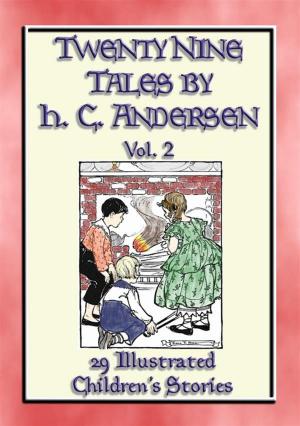THE SQUIRE OF LOW DEGREE - Book 4 from the Stories of the Faerie Queene
Stories of the Faerie Queene - Book 4
Fiction & Literature, Religious, Science Fiction & Fantasy, Fantasy| Author: | Edmund Spenser, Retold by Mary Macleod | ISBN: | 9788828333272 |
| Publisher: | Abela Publishing | Publication: | June 6, 2018 |
| Imprint: | Language: | English |
| Author: | Edmund Spenser, Retold by Mary Macleod |
| ISBN: | 9788828333272 |
| Publisher: | Abela Publishing |
| Publication: | June 6, 2018 |
| Imprint: | |
| Language: | English |
FREE EBOOK – “The Squire of Low Degree”, also known as The Sqyr of Lowe Degree, is an anonymous late Middle English or early Modern English verse romance. Originally published as a poem as the fourth part of “Stories from the Faerie Queene” by Edmund Spencer, here Mary Macleod represents the poems in the form of a novel.
SYNOPSIS
There is little doubt that it was intended to be enjoyed by the masses rather than the wealthy or aristocratic sections of society, and, perhaps in consequence of this, it was one of the better-known of the English romances during the Elizabethan and Jacobean eras. It was reprinted on demand in the 19th century.
It was a squyer of lowe degré
That loved the kings doughter of Hungré.[Hungary]
After seven years of undeclared love the squire opens his heart to the princess. She replies that she loves him, but that as a mere squire he will have to prove himself by fighting his way to Jerusalem and laying his sword on the Holy Sepulchre. Only this, she believes, will be enough to convince her father that they should marry. Their conversation is overheard by the king's steward, who steals off to the king to report it, and adds the malicious lie that the squire has made an attempt on the princess's virtue. The king has a good opinion of the squire and is reluctant to believe this, but tells the steward to watch the princess's room closely to see whether the squire will visit her. The squire now goes to the king to ask his leave to go abroad adventuring. On being given this permission the squire sets out, but turns aside from his way to visit the princess's chamber and make his farewells. There, finding the steward and a numerous body of men-at-arms lying in wait for him, he asks the princess to let him in.
Well, what happened next? It may not quite be what you think. To find the answer to your questions and what happened to the Princess and the Squire love for each other, we invite you to download this story and enjoy the 4th book in the series.
===============
KEYWORDS/TAGS: Squire, Prince, Amoret, Amyas, Placidas, Emilia, Arthur, dwarf, lady, Pœana, Poeana, captive, daughter, prison, savage, friends, Giant, favour, Corflambo, beautiful, Belphœbe, dungeon, liberty, shield, forest, wicked, marry, Princess, wood, pleasure, thraldom, hideous, bondage, Slander, Knight, castle, King, Queen, spite, noble, folly, vanquish, gallop, dromedary, war horse, Scudamour, Red cross, Good, Sir Guyon, legend, Britomart, stories, faerie queene, fairy queen, Edmund Spenser, classic poem, Folklore, Fairy Tales, Myths, Children’s Stories, Childrens, fables, easy reading, virtues, morals, Lady Una, Holy Sepulchre, Jerusalem, sword, opinion, chamber, guards, steward, men at arms, Hungary, Princess, malicious lie, abroad adventuring, altar
FREE EBOOK – “The Squire of Low Degree”, also known as The Sqyr of Lowe Degree, is an anonymous late Middle English or early Modern English verse romance. Originally published as a poem as the fourth part of “Stories from the Faerie Queene” by Edmund Spencer, here Mary Macleod represents the poems in the form of a novel.
SYNOPSIS
There is little doubt that it was intended to be enjoyed by the masses rather than the wealthy or aristocratic sections of society, and, perhaps in consequence of this, it was one of the better-known of the English romances during the Elizabethan and Jacobean eras. It was reprinted on demand in the 19th century.
It was a squyer of lowe degré
That loved the kings doughter of Hungré.[Hungary]
After seven years of undeclared love the squire opens his heart to the princess. She replies that she loves him, but that as a mere squire he will have to prove himself by fighting his way to Jerusalem and laying his sword on the Holy Sepulchre. Only this, she believes, will be enough to convince her father that they should marry. Their conversation is overheard by the king's steward, who steals off to the king to report it, and adds the malicious lie that the squire has made an attempt on the princess's virtue. The king has a good opinion of the squire and is reluctant to believe this, but tells the steward to watch the princess's room closely to see whether the squire will visit her. The squire now goes to the king to ask his leave to go abroad adventuring. On being given this permission the squire sets out, but turns aside from his way to visit the princess's chamber and make his farewells. There, finding the steward and a numerous body of men-at-arms lying in wait for him, he asks the princess to let him in.
Well, what happened next? It may not quite be what you think. To find the answer to your questions and what happened to the Princess and the Squire love for each other, we invite you to download this story and enjoy the 4th book in the series.
===============
KEYWORDS/TAGS: Squire, Prince, Amoret, Amyas, Placidas, Emilia, Arthur, dwarf, lady, Pœana, Poeana, captive, daughter, prison, savage, friends, Giant, favour, Corflambo, beautiful, Belphœbe, dungeon, liberty, shield, forest, wicked, marry, Princess, wood, pleasure, thraldom, hideous, bondage, Slander, Knight, castle, King, Queen, spite, noble, folly, vanquish, gallop, dromedary, war horse, Scudamour, Red cross, Good, Sir Guyon, legend, Britomart, stories, faerie queene, fairy queen, Edmund Spenser, classic poem, Folklore, Fairy Tales, Myths, Children’s Stories, Childrens, fables, easy reading, virtues, morals, Lady Una, Holy Sepulchre, Jerusalem, sword, opinion, chamber, guards, steward, men at arms, Hungary, Princess, malicious lie, abroad adventuring, altar















